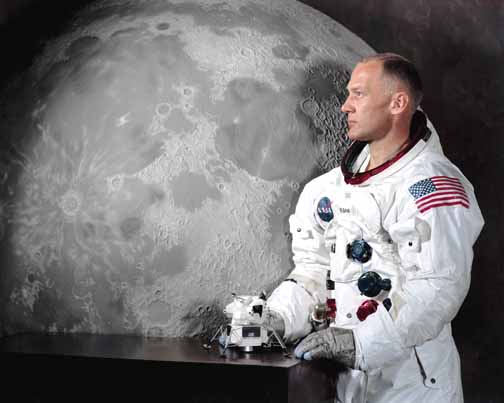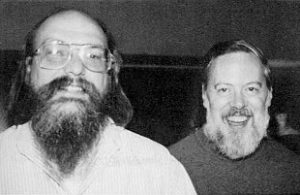July 20, 1969—a day that would go down in history, as the first humans went on to set foot on the Moon. With an estimated 530 million people worldwide watching at the time, today’s generation can recall their parents or grandparents describe the chills they felt as Neil Armstrong spoke his famous words.1 People today tend to forget that there was a second man to touch down some fifteen minutes after Armstrong: Edwin “Buzz” Aldrin, a man sometimes forgotten simply because he was not the first man on the Moon, on a mission that could have been quite capably another NASA tragedy.
The Apollo 11 Mission consisted of a crew of three men; Apollo 11 Commander Neil Armstrong, Command Module Pilot Michael Collins, and Lunar Module Pilot Edwin “Buzz” Armstrong.2 On July 16, 1969, the crew prepared to launch from Cape Kennedy in Florida. Aldrin described what he saw, as his colleagues were being strapped into the rocket. He took in the moment and the magnitude of the journey the crew was about to embark on:

“As far as I could see there were people and cars lining the beaches and highways. The surf was just beginning to rise out of an azure-blue ocean. I could see the massiveness of the Saturn V rocket below and the magnificent precision of Apollo above. I savored the wait and marked the minutes in my mind as something I would always want to remember.”3
At 9:32 a.m. on July 16, 1969, the Saturn V Rocket ignited, launching the crew of Apollo 11 towards the Moon some 238,900 miles away. Aldrin poetically describes his view of Earth from space, “The thought reoccurred that wars are generally fought for territory or are disputes over borders; from space the arbitrary borders established on Earth cannot be seen.”4
On July 20, with the ever growing Moon in sight, the Lunar Module detached from the Command Module. From here on out, Aldrin was the pilot. It was his turn to etch his name in the history of humankind.
While advancing toward the Moon’s surface, the dreaded yellow caution light came on. Being so far away from Earth, yet so close to the surface of the Moon, the astronauts’ only hope was that the malfunction wasn’t critical. “Hearts shot up into throats while we waited to learn what would happen.”5 The crew received another caution warning before being told by their flight commander back in Houston to proceed. Following the first two warnings, Aldrin and Armstrong went on to receive at least three more warnings before being reassured, once again, that the mission was still a go.
July 20, 1969 at 4:17 p.m. — Edwin “Buzz” Aldrin successfully lands Lunar Module Eagle on the surface of the Moon in Mare Tranquillitatis (The Sea of Tranquility). Command Center has been painfully waiting four long days to hear Aldrin radio the words of success: “Houston, Tranquility Base here. The Eagle has landed.”6

Edwin “Buzz” Aldrin became the second man to set a pair of footprints on the surface of the Moon some fifteen minutes after his Command Leader Neil Armstrong initially touched down. When asked about the Moon’s scenery, Aldrin described it as “Beautiful, beautiful. Magnificent Desolation.”7 The crew spent the following hours taking samples from the Moon, taking photos, and of course, planting the American Flag on the Moon’s surface.
Twenty-one hours after landing, it was time to head back to Earth. The Eagle would meet back up with the Command Module Columbia and its pilot Michael Collins in the Moon’s orbit. The crew shared a brief celebratory moment before preparing their return voyage—back towards Earth’s orbit. The crew would return to Earth eight days after launch, landing in the Pacific Ocean on July 24, 1969.8 In a stunning display of American science Buzz Armstrong, along with the rest of the Apollo 11 crew, ultimately ended the Space Race—heeding President John F Kennedy’s 1961 call to put American men on the Moon and safely return them before the decade’s end.

“And, therefore, as we set sail we ask God’s blessing on the most hazardous and dangerous and greatest adventure on which man has ever embarked.” — John F. Kennedy, September 12, 1962
- Sarah Loff, “Apollo 11 Mission Overview,” NASA, April 17, 2015. http://www.nasa.gov/mission_pages/apollo/missions/apollo11.html. ↵
- Lawrence W. Baker, Sarah Hermsen, Rob Nagel, Peggi Saari, Space Exploration Reference Library (Detriot; UXL, 2008), 178. ↵
- Edgar M. Cortright, Apollo Expeditions to the Moon: The NASA History (Courier Corporation, 2012), 204. ↵
- Edgar M. Cortright, Apollo Expeditions to the Moon: The NASA History (Courier Corporation, 2012), 206. ↵
- Edgar M. Cortright, Apollo Expeditions to the Moon: The NASA History (Courier Corporation, 2012), 212. ↵
- NASA Content Administrator, “July 20, 1969: One Giant Leap For Mankind.” NASA, February 19, 2015, http://www.nasa.gov/mission_pages/apollo/apollo11.html. ↵
- Buzz Aldrin and Wayne Warga, Return to Earth (Open Road Media, 2015), ebook. ↵
- Buzz Aldrin and Wayne Warga, Return to Earth (Open Road Media, 2015), ebook. ↵



97 comments
Felipe Macias
Aldrin’s comment on the boundaries which cannot be seen from space really brings out the importance of perspective. People seem to think certain things are important or critical to one’s being, yet when looking at the same things from a different view, its obvious we are, as a common people, naive of our surroundings. Regardless of if the moon landings are bogus or not, a push for exploration is a great concept.
Roberto Rodriguez
I am extremely happy that I found this article, I have heard the name Buzz Aldrin before, but shamefully never knew exactly what he did. I knew he was a famous astronaut and he was a great man/American, but other than that… really didn’t know anything else. This article made me want to do more research on him, it peaked my interest in his amazing background as well as life after the moon landing. Why he isn’t talked about more is really a shame, but I am proud to say that now that I know that he landed the Lunar Module Eagle on the moon I will talk about him and try to put him first, before talking about Neil Armstrong.
Addie Piatz
You read about this moment in history class and you watch the videos of it happening but how amazing would it have been to see it in person. Making history with all those people watching, not knowing if you were ever going to make it back. One thing i’ve noticed about the individual who have had the pleasure togo to space always say how peaceful it is. One thing I liked that “Buzz'” said was how we’re always fighting for land and boarders but those cant even be seen from way up there. I thought that was beautiful.
Cassandra Sanchez
Buzz Aldrin’s story is underappreciated as he made important contributions to this voyage and helped achieve this great moment in history. I love reading stories where you learn the background of these important events and accomplishments in history because behind every story there is an incredibly talented crew who worked so hard to discover new things and share them with the rest of the world.
Vanessa Sanchez
Awesome article I had never heard of this man till today. Its sad to say that even though he was such an impact he isn’t being recognized. Aldrin prove to be such a brave man. Aldrin was the second man on the moon and to see he doesn’t get recognized for it is sad. Thanks to this article that can be changed at least little by little. He deserves for his name to be out there. Awesome story.
Octaviano Huron
I love that this article gives credit to a man who was on the same voyage as Neil Armstrong, but yet is not as well known as the latter. Like Neil Armstrong, Buzz Aldrin was a truly brave man as he voyaged through the unknown, unpredictable realm of space. I loved the imagery this article had to offer; they truly capture the essence of the “magnificent desolation” that Aldrin had described. This was a wonderful article that I enjoyed reading.
Nadia Carrasco
This article was immediately eye catching for me because I have always wondered why the second man on the moon was never talked about? Reading through the article this question was not quite answered. The article focuses more on Aldrin, and what he contributed to NASA. Overall this was a great read, really had me interested to learn more about Aldrin. Congrats!
Antonio Coffee
I have always found space really interesting, but until I was in high school I had only known about Neil Armstrong walking on the moon. It wasn’t until I was in a class in high school that someone also mentioned Buzz Aldrin and how he was right behind Armstrong. It is nice to see him getting some recognition. I also did not know until reading this article that he was in charge of landing the lunar module and that he had to deal with a caution light. It really puts his contribution into perspective.
Alicia Guzman
I will never forget about the first time I heard about Buzz Aldrin. I was a fourth grader living in Michigan and my world was rocked finding out that Neil Armstrong was not the only man to walk on the moon. What I really enjoyed about this article is that it acknowledges that very thing. Neil Armstrong was not the only man to walk on the moon 20 July 1969. I love that the author say that it was the day that humans walked the moon for the first time.
Noah Bolhuis
The final frontier has always had a deep interest to me, and it is disappointing that we haven’t been to the moon since this historic, milestone event. However, it is also disappointing that the world only remembers Neil Armstrong from this mission, even though he wasn’t alone. Buzz Aldrin, being the second human in history to step foot on the moon, deserves a similar, if not the same, respect as Neil However, I would love so see more and more names on this list, as it is one of my many fascinations.